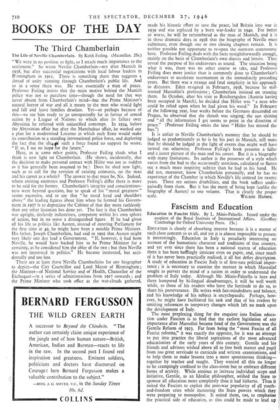Fascism and Education
EDUCATION is clearly of absorbing interest because it is a matter of such close concern to us all, and yet it is almost impossible to present it interestingly. Education in Italy is peculiarly interesting on account of the humanistic character and traditions of that country, and yet ever since there has been a national system of education there it has been bafflingly intricate even on paper, and, since much of it has never been practically realised, it all but defies description. A study of education in Fascist Italy is of first-rate political impor- tance ; it is necessary to examine the manner in which Mussolini sought to pervert the mind of a nation in order to understand the problem of Italy today. Although Mr. Minio-Paluello is here and there hampered by bi-lingual disadvantages, it will be well worth while, to those of his readers who have the fortitude to do so, to share his perseverance. He writes with fair-mindedness and balance, and his knowledge of his subject is encyclopaedic. Perhaps, how- ever, he might have facilitated his task and that of his readers by omitting references to temporary changes which left no mark upon the development of Italy.
The most perplexing thing for the enquirer into Italian educa- tion under Fascism is to find that the earliest legislation of any importance after Mussolini became head of the Government was the Gentile Reform of 1923. Far from being the "most Fascist of all Fascist reforms," it was exactly the opposite, for it was an attempt to put into practice the liberal aspirations of the most advanced educationists of the early years of this century. Gentile and his friends and advisers wished above all to free both master and pupil from too great servitude to curricula and written examinations, and to help them to make lessons into a more spontaneous thinking— together by teacher and taught. They wanted all this no longer to be crampingly confined to the class-room but to embrace different forms of activity. While anxious to increase individual scope and initiative, Gentile, as an Idealist philosopher, wished the State to sponsor all education more completely than it had hitherto. Thus it suited the Fascists to exploit the post-war popularity of all youth- and-freedom cries while increasing the State powers which they were preparing to monopolise. It suited them, too, to emphasise the practical side of education, as this could be made'to lead up to a great deal of military training. As for the increase of individual eedom in education, De Vecchi, later made himself, as Minister, to so complete a dictator that it ceased to have any serious meaning. The Italian educational framework (dating from 1859) has, as Mr. Minio-Paluello implied that it would, survived the Fascist period with relative success. And, despite those twenty years, the mentality of the nation is anything but Fascist. The greatest difficulties of today are due to the destruction or requisitioning of school buildings and the under-nourishment of teachers and pupils alike. What is to happen when I.I.N.R.R.A. is no longer there to supply mid-day meals in the schools one trembles to think, for these are mostly the only meals the teachers or children are certain to get, and the swollen crowds of university students are nearly all hungrier than they should be. In defiance of all these troubles, some of the old reformers are starting afresh. The historian, Professor Codignola, for instance, who worked with Gentile on the 1923 legislation and more recently was active in the anti-Fascist Party of Action, has founded the exceedingly interesting Scuola Citta in the poor Santa Croce quarter of Florence. There he has deliberately collected together " difficult " children from various social backgrounds, and is successfully running the school on self-governing lines. One of the greatest needs, accentuated by Italy's poverty today, is that of a scholarship system to give equality of opportunity in the place of































 Previous page
Previous page